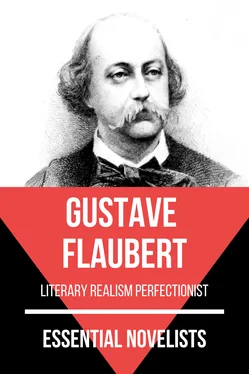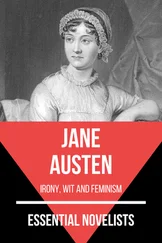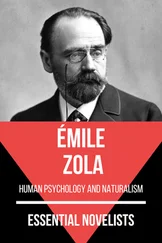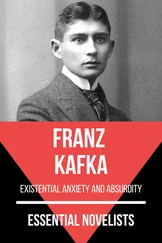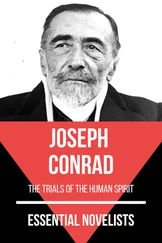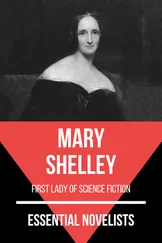“I think he is very stupid. She is tired of him, no doubt. He has dirty nails, and hasn’t shaved for three days. While he is trotting after his patients, she sits there botching socks. And she gets bored! She would like to live in town and dance polkas every evening. Poor little woman! She is gaping after love like a carp after water on a kitchen-table. With three words of gallantry she’d adore one, I’m sure of it. She’d be tender, charming. Yes; but how to get rid of her afterwards?”
Then the difficulties of love-making seen in the distance made him by contrast think of his mistress. She was an actress at Rouen, whom he kept; and when he had pondered over this image, with which, even in remembrance, he was satiated—
“Ah! Madame Bovary,” he thought, “is much prettier, especially fresher. Virginie is decidedly beginning to grow fat. She is so finiky about her pleasures; and, besides, she has a mania for prawns.”
The fields were empty, and around him Rodolphe only heard the regular beating of the grass striking against his boots, with a cry of the grasshopper hidden at a distance among the oats. He again saw Emma in her room, dressed as he had seen her, and he undressed her.
“Oh, I will have her,” he cried, striking a blow with his stick at a clod in front of him. And he at once began to consider the political part of the enterprise. He asked himself—
“Where shall we meet? By what means? We shall always be having the brat on our hands, and the servant, the neighbours, and husband, all sorts of worries. Pshaw! one would lose too much time over it.”
Then he resumed, “She really has eyes that pierce one’s heart like a gimlet. And that pale complexion! I adore pale women!”
When he reached the top of the Arguiel hills he had made up his mind. “It’s only finding the opportunities. Well, I will call in now and then. I’ll send them venison, poultry; I’ll have myself bled, if need be. We shall become friends; I’ll invite them to my place. By Jove!” added he, “there’s the agricultural show coming on. She’ll be there. I shall see her. We’ll begin boldly, for that’s the surest way.”
––––––––

AT LAST IT CAME, THE famous agricultural show. On the morning of the solemnity all the inhabitants at their doors were chatting over the preparations. The pediment of the town hall had been hung with garlands of ivy; a tent had been erected in a meadow for the banquet; and in the middle of the Place, in front of the church, a kind of bombarde was to announce the arrival of the prefect and the names of the successful farmers who had obtained prizes. The National Guard of Buchy (there was none at Yonville) had come to join the corps of firemen, of whom Binet was captain. On that day he wore a collar even higher than usual; and, tightly buttoned in his tunic, his figure was so stiff and motionless that the whole vital portion of his person seemed to have descended into his legs, which rose in a cadence of set steps with a single movement. As there was some rivalry between the tax-collector and the colonel, both, to show off their talents, drilled their men separately. One saw the red epaulettes and the black breastplates pass and re-pass alternately; there was no end to it, and it constantly began again. There had never been such a display of pomp. Several citizens had scoured their houses the evening before; tri-coloured flags hung from half-open windows; all the public-houses were full; and in the lovely weather the starched caps, the golden crosses, and the coloured neckerchiefs seemed whiter than snow, shone in the sun, and relieved with the motley colours the sombre monotony of the frock-coats and blue smocks. The neighbouring farmers’ wives, when they got off their horses, pulled out the long pins that fastened around them their dresses, turned up for fear of mud; and the husbands, for their part, in order to save their hats, kept their handkerchiefs around them, holding one corner between their teeth.
The crowd came into the main street from both ends of the village. People poured in from the lanes, the alleys, the houses; and from time to time one heard knockers banging against doors closing behind women with their gloves, who were going out to see the fete. What was most admired were two long lamp-stands covered with lanterns, that flanked a platform on which the authorities were to sit. Besides this there were against the four columns of the town hall four kinds of poles, each bearing a small standard of greenish cloth, embellished with inscriptions in gold letters.
On one was written, “To Commerce”; on the other, “To Agriculture”; on the third, “To Industry”; and on the fourth, “To the Fine Arts.”
But the jubilation that brightened all faces seemed to darken that of Madame Lefrancois, the innkeeper. Standing on her kitchen-steps she muttered to herself, “What rubbish! what rubbish! With their canvas booth! Do they think the prefect will be glad to dine down there under a tent like a gipsy? They call all this fussing doing good to the place! Then it wasn’t worth while sending to Neufchatel for the keeper of a cookshop! And for whom? For cowherds! tatterdemalions!”
The druggist was passing. He had on a frock-coat, nankeen trousers, beaver shoes, and, for a wonder, a hat with a low crown.
“Your servant! Excuse me, I am in a hurry.” And as the fat widow asked where he was going—
“It seems odd to you, doesn’t it, I who am always more cooped up in my laboratory than the man’s rat in his cheese.”
“What cheese?” asked the landlady.
“Oh, nothing! nothing!” Homais continued. “I merely wished to convey to you, Madame Lefrancois, that I usually live at home like a recluse. To-day, however, considering the circumstances, it is necessary—”
“Oh, you’re going down there!” she said contemptuously.
“Yes, I am going,” replied the druggist, astonished. “Am I not a member of the consulting commission?”
Mere Lefrancois looked at him for a few moments, and ended by saying with a smile—
“That’s another pair of shoes! But what does agriculture matter to you? Do you understand anything about it?”
“Certainly I understand it, since I am a druggist—that is to say, a chemist. And the object of chemistry, Madame Lefrancois, being the knowledge of the reciprocal and molecular action of all natural bodies, it follows that agriculture is comprised within its domain. And, in fact, the composition of the manure, the fermentation of liquids, the analyses of gases, and the influence of miasmata, what, I ask you, is all this, if it isn’t chemistry, pure and simple?”
The landlady did not answer. Homais went on—
“Do you think that to be an agriculturist it is necessary to have tilled the earth or fattened fowls oneself? It is necessary rather to know the composition of the substances in question—the geological strata, the atmospheric actions, the quality of the soil, the minerals, the waters, the density of the different bodies, their capillarity, and what not. And one must be master of all the principles of hygiene in order to direct, criticize the construction of buildings, the feeding of animals, the diet of domestics. And, moreover, Madame Lefrancois, one must know botany, be able to distinguish between plants, you understand, which are the wholesome and those that are deleterious, which are unproductive and which nutritive, if it is well to pull them up here and re-sow them there, to propagate some, destroy others; in brief, one must keep pace with science by means of pamphlets and public papers, be always on the alert to find out improvements.”
Читать дальше
